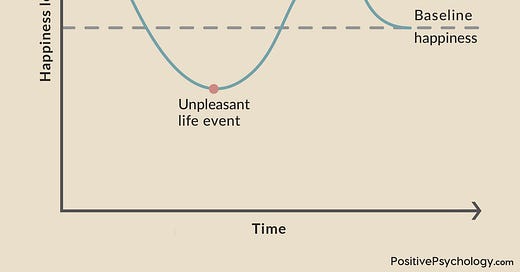The Happiness Baseline
"The surge of happiness [or sadness] that’s felt after a positive event is likely to return to a steady personal baseline over time."
You are reading (Not a) Newsletter, a newsletter published three times a month covering productivity tips and tools, (life) hacks, and a lot of tea. This newsletter is sustained by paid subscribers who make one episode free monthly. To subscribe as a Non-Nigerian reader, use the subscription button below. As a Nigerian reader, subscription costs N1,000/month (N600 for secondary school and undergraduate students with proof of studentship) or N10,000/annum (N7,000/annum for students), and you can make direct payments to 0759829842, Access Bank Plc; send proof of payment to akinyemimuhammed@gmail.com.
Happiness is fleeting. But you already know that, don’t you? Sadness is also transient, although it typically feels like it lasts longer than happiness. Depending on how you choose to see it, there is a problem or relief with how we feel, and it is that we have a baseline for our happiness. A place that, no matter what great joy or sadness you feel, you will always return to.
Assuming that you bought a car today and you feel happy, your feelings will return to your baseline happiness after a while. If you break up with your partner, you will be sad for a while, but your emotions will slowly return to your baseline.
There is a little problem, however, especially for people like me (adrenaline junkies):

Getting a new job will not keep our adrenaline pumped forever. A new relationship? A new pair of footwear? A new house? There will be great excitement. But everything will return to the baseline. Why?!
Hedonic Treadmill
The definition of happiness to different people typically means other things. But despite life choices, some psychologists believe you inherit at least 50% of your capacity for happiness.
Although, life experiences can slowly and slightly alter our perception of happiness and excitability. Typically, however, many people will live life having almost the same happiness metrics they inherited and were raised on. This means they may own mansions, desire and have a happy family, be wealthy, and still return to the happiness level they had before they had all of those things.
This is the hedonic treadmill.
As Rebecca Joy aptly puts it, “the hedonic treadmill is a metaphor for the human tendency to pursue one pleasure after another. That’s because the surge of happiness that’s felt after a positive event is likely to return to a steady personal baseline over time.”
Are we doomed?
Not exactly.
You can game the system. Psychologist Sheldon Kennon (and his colleagues) argue that “variety can counteract this hedonic adaptation. By definition, adaptation happens only in response to constant or repeated stimuli, whereas a variety of thoughts, behaviours, and experiences are innately stimulating and rewarding.
In other words, investing in multiple life domains, instead of just one, is a way to counteract the hedonic treadmill by increasing the variety of our experiences and emotions, leading to more durable happiness.”
Rebecca Joy also noted that “another factor that can influence the duration of your feelings has to do with whether you compare yourself to others in seeking happiness. Studies show that when you pursue something in part because other people have it, the happiness you experience wears off swiftly. If you’ve attained something that you value for its own sake, whether or not anyone else wants it, your satisfaction may be more likely to persist.
Your own sentimentality can even prolong feelings of happiness. In a 2015 analysis, researchers compared the results of seven studies. They found that when people associate sentimental value with an event, the happiness they get from it remains more constant over time. That may be because people don’t think of an occurrence on its own, but make a sentimental association with it. For instance, when admiring the pot holder your child knitted for you at camp many years ago, the upswell of delight is less about the beauty of the pot holder than it is about the child who crafted it.”
Another thing that may game your happiness level over time is being in service of others. This is tied to eudaimonia, “the fulfilment we experience from pursuing meaningful activities.”
TEA
What if I told you that the reason for NAN’s absence last week was that I did not know what the date was? I have been so keen on getting to June that it eluded me that last Monday was a Monday in May! But hey, here we are!
Since the last NAN, my interactive report on the oil bunkering industry and its resultant soot impact in Rivers state has been republished by the cross-border newsroom, Unbias The News.

You can read it here.
Until the next NAN, be kind to yourself and the world around you; be patient with yourself and others; love yourself and the people around you; do not give up on things that matter to you unless giving up will provide you more peace and security.




